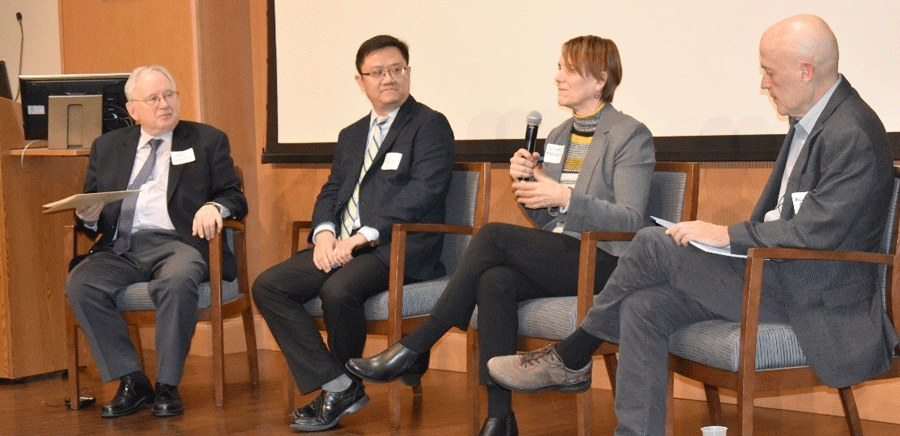CHINA Town Hall: The evolving US-China relationship
December 06, 2019
 Left to right: Serving as moderator for the panel was Joel Glassman, director emeritus
of the International Studies Program at UMSL. Panelists included Zhao Ma of Washington
University, Susan Brownell of UMSL and Allan MacNeill, professor of political economy
at Webster University
Left to right: Serving as moderator for the panel was Joel Glassman, director emeritus
of the International Studies Program at UMSL. Panelists included Zhao Ma of Washington
University, Susan Brownell of UMSL and Allan MacNeill, professor of political economy
at Webster University
On the evening Nov. 18, the Confucius Institute at Webster University (WUCI) and the World Affairs Council of St. Louis (WACSTL) co-hosted the CHINA Town Hall event discussing the relationship between the U.S. and China.
Students, faculty, staff, and community members gathered in the auditorium of Webster University’s Gateway Campus in downtown St. Louis to participate in the event. The program consisted of two components: a nationwide webcast discussion and an in-person panel of local experts who dissected the webcast and provided their own commentary on issues raised.
More than 75 venues across the United States tuned in to webcast discussion hosted by ABC news anchor George Stephanopoulos. Experts currently working in the field of China policy – Stephen Orlins, Melanie Hart, Yasheng Huang, and Ely Ratner – gave their take on a number of issues relating to China’s domestic politics and the U.S.-China relationship.
Panelists on the webcast recognized that the bilateral relationship is facing multiple challenges as the two countries move from a relationship of strategic partnership to one that is more of a strategic competition. One main issue under discussion was the trade relationship, which has undergone major changes under the current U.S. administration and led to a varied discussion on how the United States might continue to adjust its policy. The discussion also touched upon domestic politics and regional security, from Hong Kong to China’s relevance to U.S. policy regarding North Korea.

The second component of the event was a discussion by a local panel of experts moderated by Joel Glassman, director emeritus of the International Studies Program at UMSL. Panelists included Webster’s own Allan MacNeill, professor of political economy, as well as Susan Brownell of UMSL and Zhao Ma of Washington University.
These panelists elaborated on the ideas from the webcast, introducing new trains of thought based on their areas of expertise. Brownell drew on her many years of experience in China to characterize the current tension in Hong Kong as stemming from identity politics that has been brewing since the territory was handed back to mainland China. Ma spoke more on North Korea, explaining how China’s increasing openness to the rest of the world has contributed to North Korea’s sense of insecurity, while MacNeill elaborated on some of the economic and trade policies raised in the webcast that the U.S. might conceivably pursue with China. The audience was also active during this period, asking many thought-provoking questions of the panelists.
More information of these events can be found on the National Committee on U.S. China Relations website.
